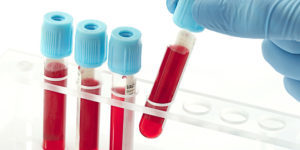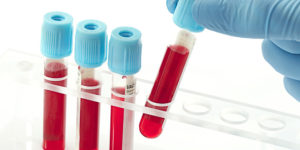
Blood Test Can Predict Type Of Treatment For Advanced Prostate Cancer
Washington D.C (USA): A recent study has found that a blood test will be enough to predict optimal treatment for advanced prostate cancer.

The study was conducted by an international collaboration involving Lawson Health Research Institute, the Royal Marsden, Epic Sciences and Memorial Sloan Kettering Cancer Center. The study is being considered as one of the first to demonstrate that a simple blood test can predict how patients with advanced prostate cancer may respond to specific treatment approaches leading to improved survival.
During the study, a liquid biopsy test was used by developing molecular diagnostics company Epic Sciences that examines circulating tumor cells (CTCs) in blood samples from advanced prostate cancer patients.

The test helps identify whether or not a patient’s CTCs contain a protein called AR-V7 in the cell’s nucleus. The research involved in determining whether the presence of this protein predicted which treatment would best prolong a patient’s life.
Scientist Dr. Alison Allan said, “The study focused on a critical decision point when patients and their oncologists are choosing what therapy to pursue next. We are addressing a critical unmet need by validating that a blood test or liquid biopsy can be used to select a therapy most likely to extend a patient’s life.”
There were a total of 142 research participants with advanced prostate cancer from the London Regional Cancer Program at the London Health Sciences Centre (LHSC).
The patients for the research had already undergone at least a round of hormone-targeting therapy without success and were under their oncologist’s supervision to decide whether to switch to a different hormone-targeting therapy or to chemotherapy as their next line of treatment.
The growth of Prostate cancer growth relies on hormones called androgens which also include testosterone. Androgen deprivation therapy like ARS inhibitors blocks the production of all male hormones to treat the recurrence or spread of prostate cancer.
Now the team plans to collaborate further with Epic Sciences to evaluate different versions of the CTC blood test for other types of cancer, such as lung cancer.
Full findings related to this research is present in the journal- JAMA Oncology.
Prostate cancer is the disease of cancer development in the prostate gland. The prostate gland is located at the male reproductive system. Most prostate cancers are slow while growing; however, some type of them may grow relatively quickly. The cancer cells may spread very rapidly from the prostate to other areas of the body, particularly the bones and lymph nodes.
You May Also Read: Central Government Issues Advisory To States To Keep Mob Violence, Lynching In Check